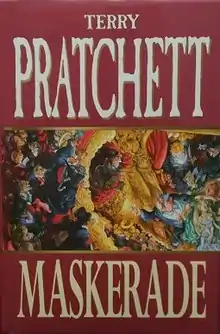Maskerade
Maskerade is a fantasy novel by British writer Terry Pratchett, the eighteenth book in the Discworld series.[1] The witches Granny Weatherwax and Nanny Ogg visit the Ankh-Morpork Opera House to find Agnes Nitt, a girl from Lancre, and get caught up in a story similar to The Phantom of the Opera.
 First edition | |
| Author | Terry Pratchett |
|---|---|
| Cover artist | Josh Kirby |
| Language | English |
| Series | Discworld 18th novel – 5th witches story |
| Subject | Opera, The Phantom of the Opera
|
| Genre | Fantasy |
| Publisher | Victor Gollancz |
Publication date | November 1995 |
| ISBN | 0-575-05808-0 |
Plot summary
The story begins with Agnes Nitt leaving Lancre to seek a career at the Opera House in Ankh-Morpork. When Granny Weatherwax realizes Nanny Ogg has written an immensely popular "cookbook" but has not been paid by the publisher, the witches also leave for Ankh-Morpork to collect the money, as well as to attempt to recruit Agnes into their coven, to replace Magrat Garlick who left the coven when she became Queen of Lancre (in Lords and Ladies). This has the side benefit of distracting Granny from becoming obsessive and self-centered, or so Nanny believes to her great relief.
Agnes Nitt is chosen as a member of the chorus, where she meets Christine, a more popular but less talented girl. The Opera House Ghost, who has long haunted the opera house without much incident, begins to commit seemingly random murders staged as "accidents", and also requests that Christine be given lead roles in several upcoming productions. Due to her incredibly powerful and versatile voice, Agnes is asked to sing the parts from the background, unbeknownst to Christine or the audience.
Having discovered the problems at the opera house and also having coerced the publisher to pay Nanny richly for her book, the witches investigate the mystery, with Granny posing as a rich patron, and Nanny insinuating herself into the opera house staff. Agnes unmasks Walter Plinge, the janitor, as the ghost, though as he is seemingly harmless, the others are unconvinced. Another employee is suspected, but turns out to be a member of the Cable Street Particulars. The witches determine that the finances of the Opera House, which are a complete mess, have been made so intentionally in order to hide the fact that money is being stolen, with the murders being used either as a distraction or to cover evidence.
It is finally revealed that two people had been masquerading as the ghost. The original (and harmless) ghost, Walter Plinge, was being psychologically manipulated by the second ghost, Mr Salzella (Director of Music at the Opera House), who assumed the identity to commit the murders and theft. With the witches' help, Walter is able to overcome his fears and help defeat the murderer, who is killed by believing that the fencing staged in opera is actual lethal swordplay, dying despite not actually being injured. Walter then goes on to become the new Director of Music, integrating his own music into the opera, turning them into musicals.
Adaptations
A stage adaptation by Hana Burešová and Štěpán Otčenášek (partly using adaptation by Stephen Briggs) premiered in Divadlo v Dlouhé, Prague in April 2006.[2] Pratchett attended the closing performance five years later.[3]
Reception
Buzzfeed listed Maskerade as the 11th-best Discworld novel, noting that "it works well as a parody of the tropes of opera, and as a murder mystery".[4]
References
- Pratchett, Terry (1998-10-07). Maskerade. Harper. ISBN 9780061056918. OCLC 812696286.
- "Maškaráda čili Fantom opery - Divadlo v Dlouhé | i-divadlo.cz". www.i-divadlo.cz.
- "Terry Pratchett v Divadle v Dlouhé - Divadlo v Dlouhé". www.divadlovdlouhe.cz.
- The Definitive Listing Of Terry Pratchett's Discworld Novels, by Tom Chivers, at Buzzfeed UK; published March 2, 2015; retrieved June 3, 2017
External links
| Wikiquote has quotations related to: Maskerade |
- Maskerade title listing at the Internet Speculative Fiction Database
- Annotations for Maskerade
- Quotes from Maskerade
- Synopsis for Maskerade
- Maskerade in Czechoslovak Film Database
- Maskerade in International Film Database
| Reading order guide | ||
|---|---|---|
| Preceded by Interesting Times |
18th Discworld Novel | Succeeded by Feet of Clay |
| Preceded by Lords and Ladies |
5th Witches Story Published in 1995 |
Succeeded by Carpe Jugulum |